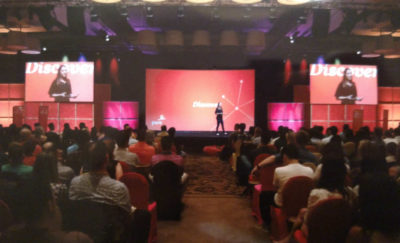This week, I’m facilitating my company’s Discover program, a reward for our newly promoted senior associates that helps with leadership development and also gives them a lot of personal coaching to help identify their individual goals and priorities. I attended Discover myself five years ago, and this is now my third time coming back as the lead “orchestrator” (basically an emcee) of the event.

No matter how many times I attend the sessions, though, I always take away something new. (To read more about what I’ve learned at past Discover sessions, see here, here, here, here, and here)
Yesterday, speaker Jullien Gordon talked about how some people say that money is a priority, but then don’t know when they have “enough” money. We work to buy the Mercedes Benz, then the fancy house, then the vacation home… and we just keep working and working to amass all these things that we may or may not actually want. At each session, Jullien encourages us to really define what “enough” money would mean for us personally, by deciding on metrics like a certain dollar value in the bank. I really love that point, because I definitely know people who continually chase a higher salary at great cost to their personal life, where they never have enough money to be satisfied. As the old saying goes, you can’t take it with you.
Today, though, I was listening to speaker Arden Pennell from The Energy Project as she talked about managing your energy throughout the day. She emphasized the importance of taking breaks throughout the day to renew your energy before continuing to work. Arden made a great point: if one of our coworkers came in talking about how well-rested and relaxed they were, would we really celebrate that they had set boundaries for themselves, or would we think, “That person must not be working hard enough”? Unfortunately, if I’m being honest, I might initially think the latter 🙁
But hearing that connected the two concepts for me. How hard do you have to work for it to be “enough”? That’s a really tough line to draw, especially when work isn’t well-defined. In today’s salaried corporate world, there isn’t a defined cutoff to finish work – and I think I’m happy with that. It shouldn’t be about how many hours we log at the office, but about the work we produce, right? However, along with that focus on output comes ambiguity that’s difficult to navigate.
If I were a widget-maker, once my production line had made a certain number of widgets, I’d be satisfied – that’s a pretty discrete goal. But the Powerpoint decks that we build today are judged much more subjectively, and it’s hard to know when we’ve done “enough.” You can always do more to tweak your visuals, tighten up your language, or pull in more data to support the conclusions being presented… but you have to stop working at some point, and call your work complete. If I’m working solo, I usually end up relying on external cues to figure out if my work is “enough”: the output looks pretty good, but also, I’m tired and want to go home, so I call that “enough”. However, I have to wonder if my definition of “enough” is higher than it needs to be.
This week, my job is to rehearse and present material to the senior associates. Some of the material is program content (teaching specific terms and concepts), and some of it is sharing my own personal experiences. I’ve probably spent about 80 hours developing and rehearsing my content… but who’s to say that I wouldn’t have done just as good a job with 40 hours? Or maybe just cutting back my prep a little bit to 79 hours? In many cases like this, I think it’s really hard to figure out what “enough” is and draw a line of when to stop refining.

If I get my work done in four hours because I’m really good at Excel, but my same-level-coworker takes eight hours to build his model, does that mean that I should do double the output because it only took me half the time? In situations like that, I usually end up applying some hybrid of measuring my work by output and by hours spent. If I “finish” something, by my standards, and it’s after 6pm or so, I’ll call it a night; if it’s prior to 6pm, I’ll start something else and work on it as long as it takes, within reason. And (assuming there isn’t a deadline), I usually leave the office by 8pm. Does that make me a hard worker, or a complete slacker? In my corporate culture, I’m honestly not sure.
I don’t really have any answers, as I’m not sure I’m ready/willing to take the potentially dangerous step of experimenting with doing less work to see if my bar for work is more than “enough”. And it seems I’m not the only one grappling with this question; several years ago, productivity pro Laura Stack tried to address the question of how much work is enough, concluding only that “enough” work is essentially whatever you can do without sacrificing your personal obligations. But that leads me to ask: how much personal time is “enough”? 😉
What we teach at Discover is that there is no one perfect balance. It’s different for everyone, and it’s constantly in flux. Sometimes we need to focus more on our families than our career, and other times we need to drop everything to better care for ourselves. That means the answer to “how much work is enough” is also a moving target, so we’ll probably never pin it down. But I do think it’s a question that’s worth continuing to evaluate.

I think “enough” is so subjective.
When I worked at [name redacted] if I wasn’t available 24/7 it wasn’t “enough”. Now, I’m expected to work 8 hours a day and no more. My role and department don’t necessitate overtime, and I can honestly say I’m exponentially happier here. However, I also know people who love and thrive at [name redacted] 😉
I always love getting your perspective, Ange! It’s so interesting to see how it differs in various company cultures. I agree that it feels like 24/7 is what I *think* I need to do, but this training always makes me question whether my perception of the expectation is accurate, or if I could in fact make my bosses happier without as much sacrifice. Definitely something to consider!